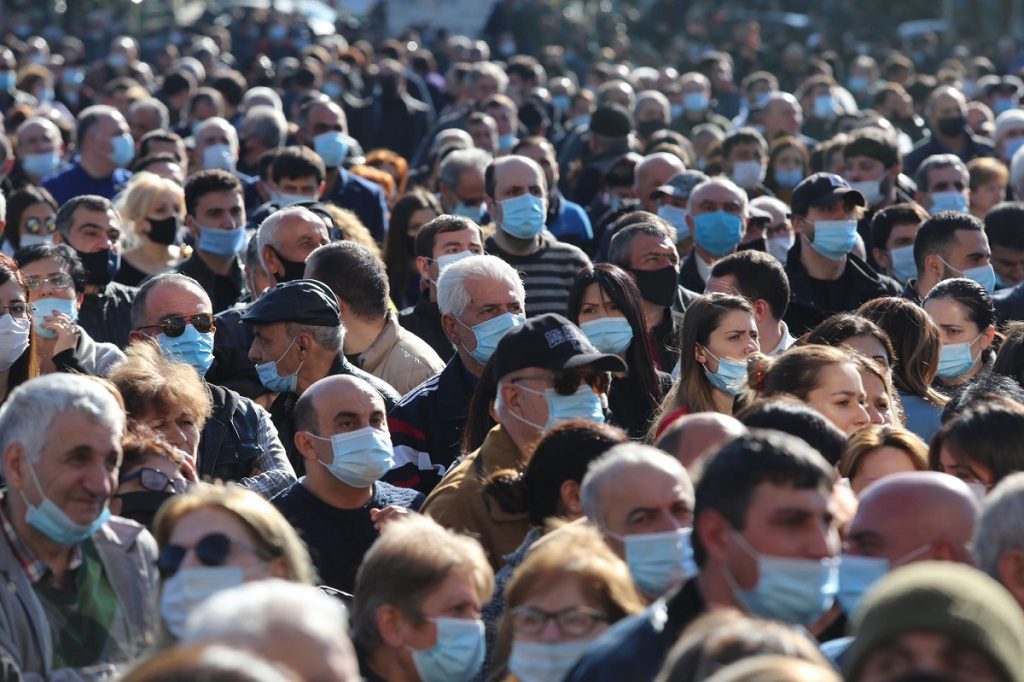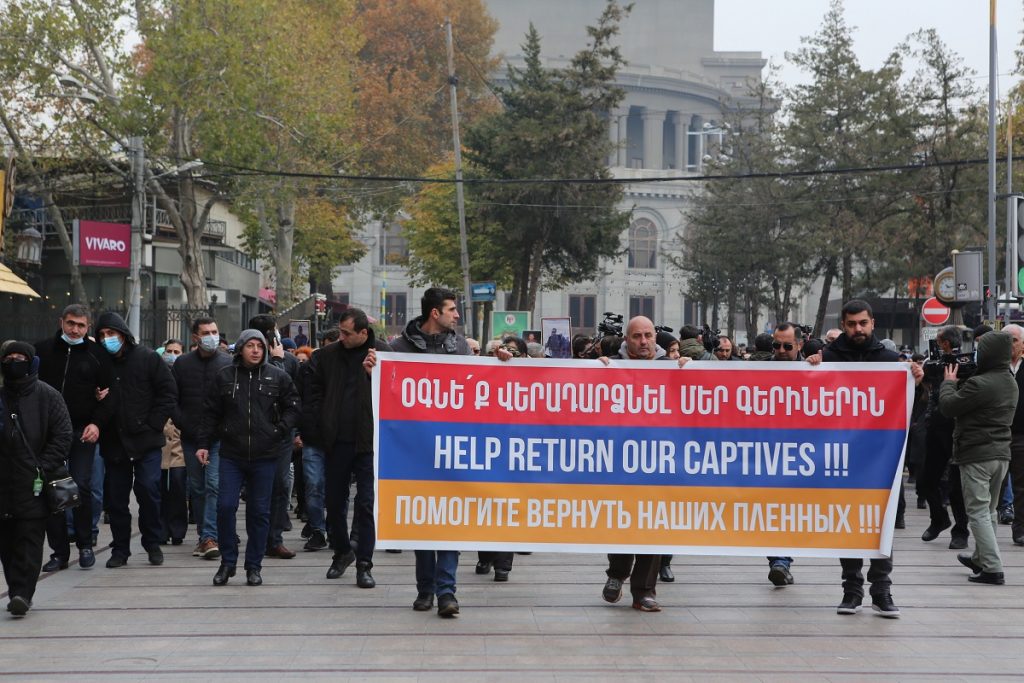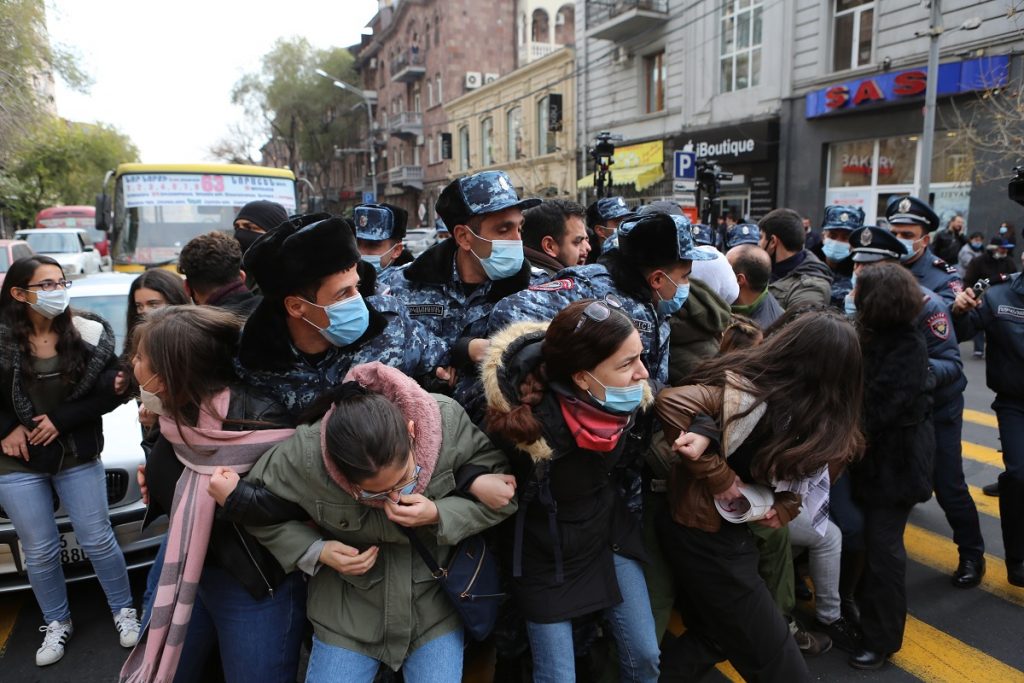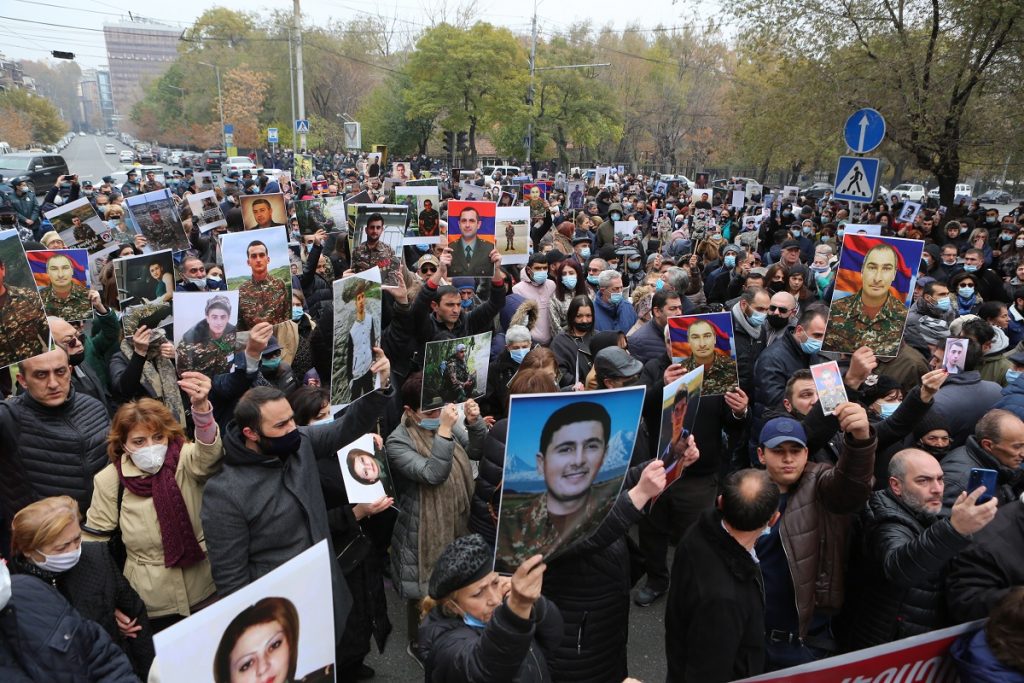Post-War Syndrome: how is Armenia experiencing the surrender?
The second Karabakh war, although it was predicted by political scientists, came as a surprise to the Armenian public.
Armenia has long been accustomed to military clashes on the line of contact between the troops of Azerbaijan and Nagorno-Karabakh. But people were not ready for such a scale of hostilities as witnessed in October and November.
Information about human and territorial losses was perceived extremely painfully, and the slightest “positive” news generated euphoria. Therefore, the results of the war, which did not promise anything good for Armenia from the very beginning, came as a shock to society, which has split into several camps.
Some put the blame for the defeat in the war on the country’s leadership, while others believe that there is no direct fault of Prime Minister Nikol Pashinyan, and the surrender was the result of corruption over the past 30 years.
- Op-ed: what is the Armenian opposition thinking, trying to force Pashinyan to resign?
- The road to Nakhichevan: is Armenia surrendering its territories to Azerbaijan or emerging from blockade?
- Op-ed: What’s next in Armenia – loss of sovereignty or global integration?
Yerevan after the surrender
The news of the signing of the agreement on the night of November 9-10 took everyone by surprise, despite the fact that things were not going well at the front could be guessed even from the scanty messages of the Ministry of Defense.
But the full picture became clear only after the publication of the clauses of the trilateral statement signed by the leaders of Armenia, Azerbaijan and Russia. According to the document, the Armenian side gave Azerbaijan not only the areas around NK, which served as a security belt, but even surrendered territories not lost during the hostilities.
The news of the signing of the surrender agreement sparked riots in Yerevan.
Despite the fact it was late at night and a curfew was in place, hundreds of people gathered in front of the government and parliament buildings. The police failed to contain the crowd, and the spontaneous demonstration escalated into a riot inside the buildings.
Speaker of the National Assembly and one of the leaders of the ruling My Step bloc Ararat Mirzoyan came to calm down the participants of the spontaneous protest. The angry crowd dealt with Mirzoyan in such a way that he had to have two operations performed later.
This was the first demonstration that showed a rapid decline in the rating of the ruling party in Armenia.
Consolidation of political forces against Pashinyan
Despite martial law, mass protests began demanding a change in opposition power. 17 opposition parties consolidated even before the signing of the agreement, and after the end of hostilities, thousands of people joined their demand for the resignation of the government and its leader.

Experts believe that there are many “protest masses” now – for post-revolutionary Armenia, which, in general, supports the authorities, but it is still not enough to overthrow the government.
President Armen Sargsyan has spoken about the need for the prime minister’s resignation, who had previously held consultations with parliamentary and extra-parliamentary forces. A similar statement was made by the Presidium of the National Academy of Sciences and other public structures.
They believe that after the defeat in the war, the Pashinyan government should voluntarily resign, or the parliament should impeach the prime minister.
The MPs of the ruling My Step bloc did not do this, and Pashinyan himself said that there was no public request for his resignation in the country, and he would leave only after the elections:
“We have internal political tension, but the truth is that the calls made by the opposition have not received wide resonance in the Armenian society. And I think that the issue of power, which was formed by the people, can only be resolved by the will of the people.”
But the fact that few people took part in protest actions does not mean support for the current government. This is evidenced by the mood on social media.
The criticism of the truce signed by Pashinyan and the results of the war is colossal. Key questions asked by users:
- why did the situation reach the critical point when any requirement of Baku had to be fulfilled,
- how the city of Shushi, which was difficult to attack, fell,
- why didn’t the authorities agree to a ceasefire earlier,
- was it possible to avoid any part of the loss,
- why proper mobilization was not carried out,
- why the air defense system of Nagorno-Karabakh was factually destroyed on the first day of the war,
- how could the wife of the prime minister end up in a command post with a military command, what influence did she have on decision-making?
Pashinyan is trying to answer these questions personally by posting on his Facebook page. But the comments to them indicate that his answers are not very convincing.

What Pashinyan’s opponents say
Did Pashinyan betray Armenia? And if so, how?
The interpretation on social media and at the protests is very different. Some call the prime minister a traitor only because he signed the trilateral agreement. Others believe that he put his political career ahead of state interests, when he did not make painful concessions at the initial stage of the war.

Pashinyan must leave because he could not avoid a war, says Yerevan resident Liana Samvelyan. She is not a member of any political party, but after the war she took an active civic position. He believes that every day of Pashiyan’s stay in power negatively affects the country:
“I believe that Pashinyan should leave his post. I am sure that it was he who brought the situation to war with his short-sighted foreign policy. The results of the war are catastrophic: about 5,000 killed, thousands of wounded, lost territories, many of our boys are now prisoners of the Azerbaijani side.
It is not clear what will happen to them when they can return home. Independent Armenia has experienced hard times, but never experienced such a crisis. The perpetrator must not only leave, but also be punished.”
Liana believes that Pashinyan has no chance to stay in power, the prime minister’s rating is falling every day – the people will not forgive him for the loss of part of Karabakh:
“The only way out now is to create an interim government, which will be able to bring the country out of the crisis within a few months. I think the incumbent president may be at the head of such a government. I cannot imagine that someone would lead the country to greater destabilization than we have now. There has never been such a crisis as now. “
Opinion of Pashinyan’s supporters
On the night after the signing of the surrender agreement, Pashinyan went live on social media several times and stated that everyone was responsible for the defeat. In particular, representatives of the previous government, who “robbed the people for many years”.
This point of view is shared by Pashinyan’s supporters: Armenia was not ready for war, because in 2.5 years the new government could not acquire weapons that had not been purchased in 30 years, to resolve issues that had not been resolved for so long.
Anahit Baghdasaryan is the mother of two children. The war forced her to closely follow the political events in the country. She is sure that Pashinyan should stay:
“After the war, I only noticed calls for his death: shoot yourself, resign. There was no talk about power, about real people who are offered by the crowd to replace him. There were more of those who chose him in 2018, because he was the only one who decided to take on this responsibility.
I believe that Pashinyan should stay until the elections are over and he is legally replaced. He, most likely, will not be re-elected, but he must leave through competition. We must have time to listen to all suggestions from other candidates. Now these are only manipulative cries of the opposition.”
Anahit believes that so far there is no real alternative to Pashinyan, and the opposition, amid defeat in the war, is trying to come to power. And Pashinyan has the resources to unite society to get out of the current situation, although Anahit does not deny the prime minister’s guilt for the defeat on the battlefield:
“Yes there is. He is a part of our society, and an important part of it, and I believe that we are all to blame for what happened. We inherited the old installations, and it was too late to change something, we were not given time for this. There is not a single person in Armenia who would not know about the state of the army, there is no person who would not know about the scale of kickbacks from the defense budget over these decades. And still, most of them were sweating from the thought that they would have to give up the land so that there would be no war.
Even after the deaths of thousands of 19-year-olds, the country yelled about the surrender of Kelbajar “without blood.” How many more people had to die for the people to notice that we had lost? If he had not signed the surrender, I would have cursed him. Our incompetent command is to blame for the outcome of the war, three decades of beating over the thrashing. It is his fault that he hoped for us, for our readiness to fight, for the myth of our “spirit”, but it turned out that we are ordinary and do not want to die ourselves, we want someone else to die for us. “

What are the chances of Pashinyan staying on?
Political scientist and economist Hrant Mikaelyan notes a clear split in the Armenian public after the war. And he distinguishes three groups at once:
“One group is for the authorities. The second is against, with an active position. The third is against the authorities, but with a passive position. All groups make up in total one third of the population with minor deviations.”
The expert notes that before the war, Pashinyan’s rating had reached 65 percent. During the war, the figure rose to 80, after the surrender it fell to 30.
He believes that several factors are currently affecting the authorities. Society is beginning to better understand what happened. Karabakh continues to lose territory even after the end of active hostilities. Recently it became known that two more villages came under the control of the Azerbaijani Armed Forces. Many accuse Pashinyan and his team of inability to return prisoners of war to their homeland. Although 45 people have already returned, it is unclear how many prisoners still remain in Azerbaijan.
“The most painful question is the incomprehensible fate of very many servicemen. Information about 5,000 dead is published. In addition, people are beginning to understand that there are currently no particular economic prospects. And the majority of voters are guided by this very logic. All this in one way or another affects the political situation.”



















